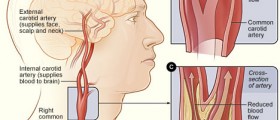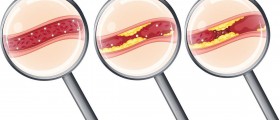
Arterial blockage in the heart
Arterial blockage in the heart is one of the most common heart disorders that occurs when the plaque, which consists of fatty materials and cholesterol, accumulates on the walls of the blood vessels. The blockage can be partial (when the blood arteries are narrowed) or it can be total, thus leading to some serious health problems.
Arterial blockage does not appear suddenly; the plaque accumulates over years due to an unhealthy diet. Coronary arteries are the blood vessels that transmit the blood to the heart. They are located on the surface of the heart. The blockage of these blood vessels results in limited blood flow where the body does not receive enough amounts of fresh oxygenated blood rich in essential nutrients.
Symptoms of arterial blockage in the heart
The most common symptom of this cardiovascular problem is chest pain or angina. It is a pain, that could be sharp or dull, persistent or transitory. It tends to spread to the abdomen, jaw, left shoulder and arm. Shortness of breath is another symptom of arterial blockage in the heart; the heart does not get sufficient blood and the body is thus deprived of sufficient amounts of oxygen. The main consequences of this condition are fatigue, tiredness and dizziness. Rapid heart rate and irregular heartbeat, as well as nausea and vomiting, are also some of the signs of arterial blockage in the heart and they should not be neglected.
If only one or two blood vessels are obstructed and arterial obstruction occurs due to the reasons that have been mentioned above, in such cases a feeling of general weakness in one side of the face or body may occur. Furthermore, it is possible that even numbness or paralysis in half of the face or in an arm or leg will appear.
When the carotid arteries (those that carry the blood to the brain) are blocked, verbal disruptions such as slurred speech may occur. The blockage of the carotid arteries may also cause sudden blindness of an eye. Peripheral artery disease refers to the blockage of the small blood vessels in the arms or legs. Therefore, a strong pain in the leg when walking may be a symptom of arterial blockage. Problems with digestion may also be a sign of an artery blockage, although this symptom might easily be mistaken for a symptom that represent some digestive tract disorder.

















Your thoughts on this
Loading...